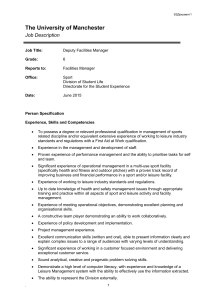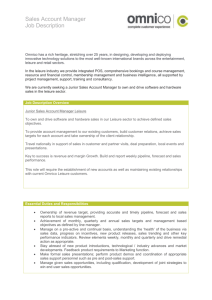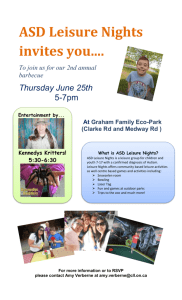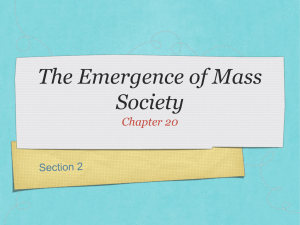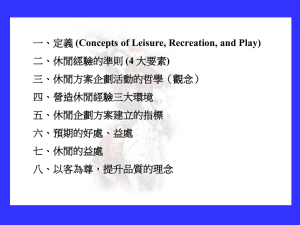Final Papers Chicago 2013
advertisement
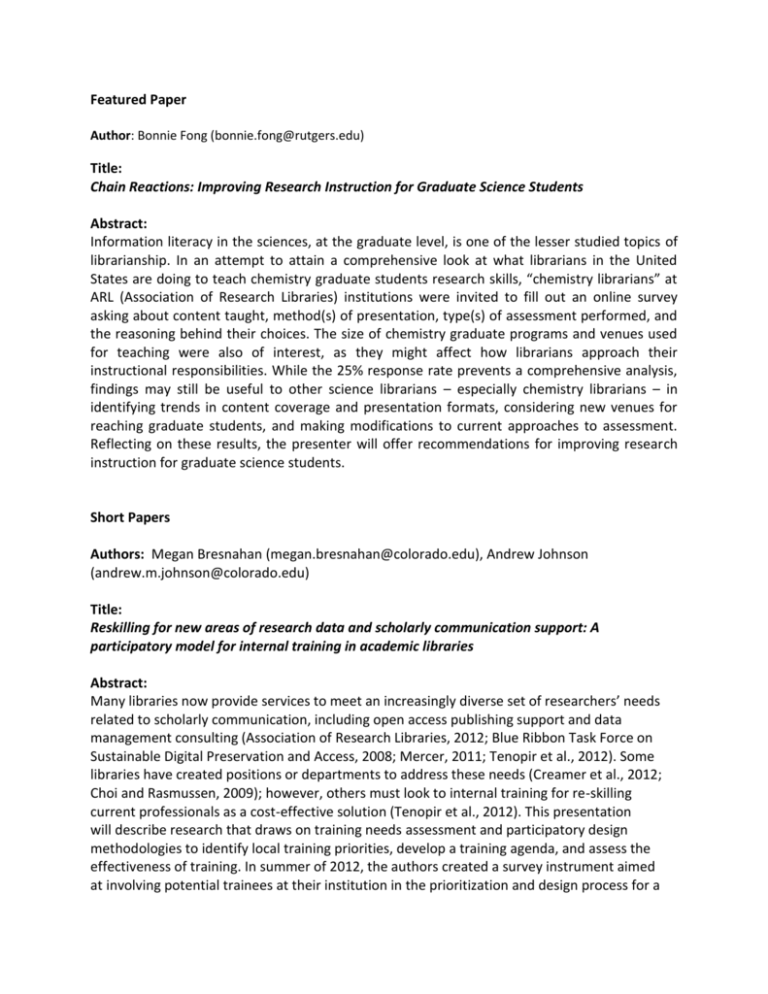
Featured Paper Author: Bonnie Fong (bonnie.fong@rutgers.edu) Title: Chain Reactions: Improving Research Instruction for Graduate Science Students Abstract: Information literacy in the sciences, at the graduate level, is one of the lesser studied topics of librarianship. In an attempt to attain a comprehensive look at what librarians in the United States are doing to teach chemistry graduate students research skills, “chemistry librarians” at ARL (Association of Research Libraries) institutions were invited to fill out an online survey asking about content taught, method(s) of presentation, type(s) of assessment performed, and the reasoning behind their choices. The size of chemistry graduate programs and venues used for teaching were also of interest, as they might affect how librarians approach their instructional responsibilities. While the 25% response rate prevents a comprehensive analysis, findings may still be useful to other science librarians – especially chemistry librarians – in identifying trends in content coverage and presentation formats, considering new venues for reaching graduate students, and making modifications to current approaches to assessment. Reflecting on these results, the presenter will offer recommendations for improving research instruction for graduate science students. Short Papers Authors: Megan Bresnahan (megan.bresnahan@colorado.edu), Andrew Johnson (andrew.m.johnson@colorado.edu) Title: Reskilling for new areas of research data and scholarly communication support: A participatory model for internal training in academic libraries Abstract: Many libraries now provide services to meet an increasingly diverse set of researchers’ needs related to scholarly communication, including open access publishing support and data management consulting (Association of Research Libraries, 2012; Blue Ribbon Task Force on Sustainable Digital Preservation and Access, 2008; Mercer, 2011; Tenopir et al., 2012). Some libraries have created positions or departments to address these needs (Creamer et al., 2012; Choi and Rasmussen, 2009); however, others must look to internal training for re-skilling current professionals as a cost-effective solution (Tenopir et al., 2012). This presentation will describe research that draws on training needs assessment and participatory design methodologies to identify local training priorities, develop a training agenda, and assess the effectiveness of training. In summer of 2012, the authors created a survey instrument aimed at involving potential trainees at their institution in the prioritization and design process for a training agenda covering a variety of topics related to scholarly communication. The authors used data from this instrument to develop and implement training opportunities throughout late 2012 and early 2013, including an interactive open access forum and a daylong hands-on data management workshop. In spring of 2013, the authors will follow up with trainees to assess the effectiveness of these efforts and identify areas needing additional training. Results from this assessment, as well as detailed descriptions of the design and implementation process, will provide a model for academic libraries to use to assess and address internal training in order to continue to meet researchers’ changing needs. Author: Edward Gonzalez (elgonzal@iupui.edu) Title: The Perceived Intrinsic Value of Leisure Reading & Leisure Among Undergraduates as a Predictor of Their Academic Achievement Literature concerning college students reading habits in their leisure time, (i.e. non-academic reading) is limited. In a Taiwan national study involving more than 174,000 students, college students spend about 1-2 hours a week on leisure reading (Chen, 2007). The US National Endowment for the Arts (2004) reported that 65% of college freshmen read for pleasure for less than an hour per week or not at all. The educational benefits of reading include enriching life, problem solving, gaining different perspectives about race, class, and culture (Moyer, 2007). Gallik (1999) reported that amount of time spent on leisure reading and academic achievement was found to be significantly correlated (Gallik). The purpose of this exploratory study is to 1) explore leisure reading habits among undergraduates, 2), explore their intrinsic value of leisure, and 3) explore how their leisure reading habits predict academic success. The research question addresses the correlation between educational attainment – a student’s GPA, and the degree of satisfaction of recreational reading and leisure activities. It is hypothesized that students with high satisfaction scores in leisure reading or leisure activities or both predicts academic success measured by GPA. Data collected via a convenient sampling methodology will be statistically analyzed using SPSS. Hence cultivating students’ reading habits and attitudes regarding reading books for leisure and in general leisure is of importance to educators, such as librarians, and administrators because it is directly related to students’ academic success or persistence or both. Author: Ruth Vondracek (ruth.vondracek@oregonstate.edu) Title: Exploring User Needs: Oregon Explorer User Needs Assessment Hypothesis: This user needs assessment is intended to inform a site redesign by determining if the current structure helps or hinders discovery, and to identify types of users, their current and future needs, and how they use the sites. Abstract: Oregon Explorer (OE), a natural resource digital library, represents a partnership between the Oregon State University Libraries and Press and the Oregon University System Institute for Natural Resources. What began as a single portal in 2004 now consists of 14 topic, location and data sites each developed with partners from state, federal, and local governmental agencies and foundations. All sites are linked through the ‘umbrella’ Oregon Explorer website. Each site offers data, stories, mapping and reporting tools, and reports. In 2001 a comprehensive user needs assessment was conducted to guide initial development. Since that time no site-wide user needs assessment has been undertaken. As each of the 14 sites were developed, design and scoping documents created with input from portal partners and clients addressed user needs. Websites statistics provide insight into frequency of use data but we have little information on who users are and how they use OE. OE is conducting a three phase user needs assessment using a survey, interviews and focus groups. Our intent is inform a site redesign by determining if the current structure helps or hinders discovery, and to identify types of users, their current and future needs, and how they use the sites. A review of the academic peer-reviewed literature revealed a dearth of articles or books concerned with user needs assessment for the redesign of long-term natural resource websites. We believe that the results from this study will assist other site developers in understanding changing user needs in the natural resources arena.

